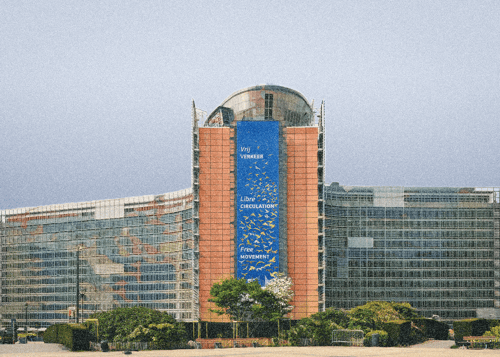
Who gets to be the next European Commission chief?
Is Ursula von der Leyen going to stay on her throne as President of the European Commission for another five years, or is anyone else taking a shot at it? Who even decides who gets the EU’s top job? That’s where the Spitzenkandidaten system comes in – how does it work (if at all) and who is vying for the position in the June elections?
Spitzenwhat?!
A Spitzenkandidat – German for ‘lead candidate’ – is the face of the electoral campaign of a <a href=”https://www.europeancorrespondent.com/article?s=What-happens-to-my-vote&utm_source=The+European+Correspondent&utm_campaign=b7f2041156-EMAIL_CAMPAIGN_2023_04_04_10_18_COPY_01&utm_medium=email&utm_term=0_-d2e5faad91-%5BLIST_EMAIL_ID%5D” style=”text-decoration: underline !important;”>political group in the European Parliament and the group’s designated choice for President of the European Commission. The idea is that EU leaders appoint the lead candidate from the group or party that emerges victorious in the European elections to head the next Commission.
Proponents of the idea aim to tackle the EU’s 'democratic deficit' by empowering voters to influence the selection of the next Commission chief, fostering a Union-wide political debate. They hope this approach enhances transparency, curbing opaque backroom dealings often associated with Brussels politics.
Does it actually work?
Despite its success in 2014, when the European People’s Party’s (EPP) lead candidate Jean-Claude Juncker became Commission President, the system flopped spectacularly in 2019. Unable to agree on any of the candidates, EU leaders pulled the unknown Ursula von der Leyen out of their hat, leaving the EPP’s actual lead candidate, Manfred Weber, empty handed.
Creating a political debate that breaks through the Brussels bubble and reaches the average voter is also harder than expected. The absence of transnational electoral lists, various languages, and the alarmingly low name recognition of many of the lead candidates all hinder the creation of European public debate.
Who is running?
Ursula von der Leyen (EPP): As current Commission President, the German politician is widely expected to snatch the crown for a second term. Recent months, however, saw her make a rightward turn, as she struggles to entertain an awkward marriage between defending her own legacy – the Green Deal – and appeasing its main critics – her own political group.
Nicolas Schmit (S&D): After Frans Timmermans’ return to Dutch politics last year, the Progressive Alliance of Socialists and Democrats (S&D) struggled to rally around a heavy-hitter that could take on von der Leyen. Hoping his experience in Luxembourgish politics would suffice to challenge his boss, the Commissioner for Employment and Social Rights became the S&D’s way forward.
Team Europe (Renew): The liberal centrists of Renew Europe have put forward not one, but three lead candidates: Marie-Agnes Strack-Zimmerman (Germany), the main face of Renew’s campaign and currently a member of the German Bundestag; Sandro Gozi (Italy), currently an MEP for France; and Valérie Hayer (France), Renew’s current president. The trio have the difficult task of retaining Renew’s status as Parliament’s kingmaker, as more right-wing forces challenge their chances for bronze in the upcoming elections.
Terry Reintke and Bas Eickhout (The Greens/European Free Alliance): Veteran MEPs Terry Reintke (Germany) and Bas Eickhout (the Netherlands) were the clear favourites for their political group’s ticket. The two will focus on “staying the course” and safeguarding the progress made on the Green Deal, which puts them in the rather awkward position of defending the main policy of their immediate rival, von der Leyen herself.
Walter Baier (The European Left): Hailing from Austria’s communist party, with under two years of European political experience, Baier surprisingly isn't listed on his own national party's ballot, and is thus not contending for an MEP seat. Rather than representing the entire left-wing group in the European Parliament, the European Left party is but one of the group's members – and the only one allowed to appoint a Spitzenkandidat.
No candidates (ECR, ID): Disgruntled with the crash and burn of 2019’s Spitzenkandidaten effort, the European Conservatives and Reformists (ECR) and Identity and Democracy (ID) groups decided not to field any lead candidates. Perhaps the nationalism both groups represent doesn’t really go hand in hand with rallying behind a pan-EU candidate. Spitzenkandidaten or not, the ECR and ID groups are expected to shift Parliament’s centre of gravity rightward.